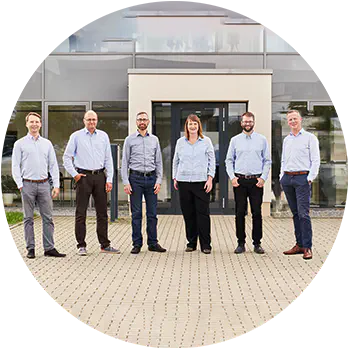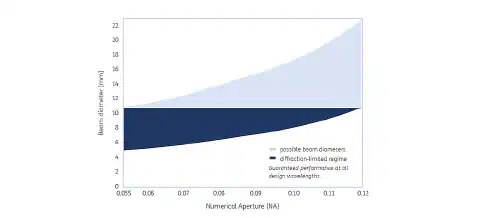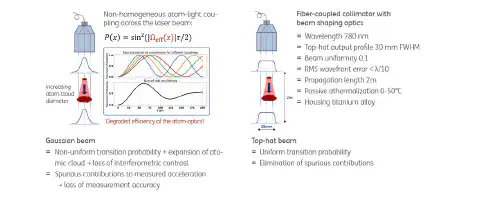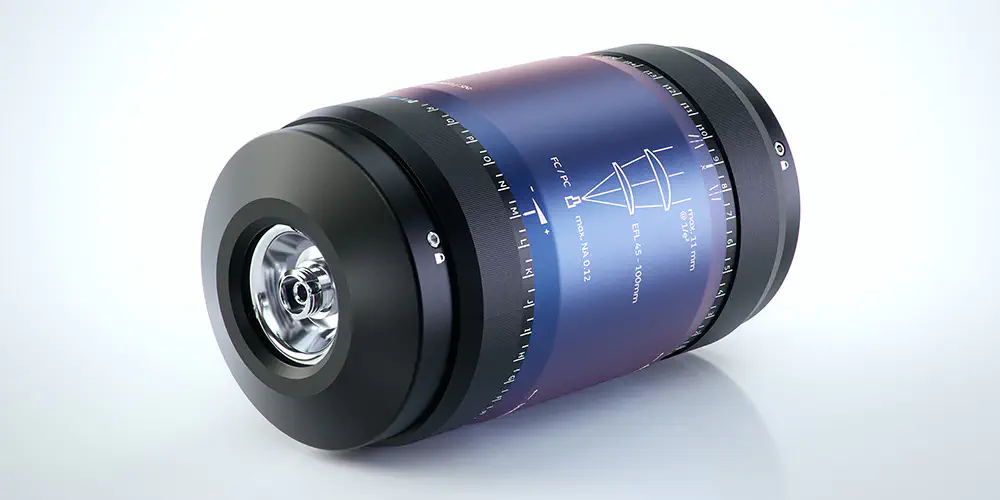
Fiber Coupling
Perfect for FC/PC patch fibers
Optimized laser fiber coupling and fiber collimation
asphericon’s adjustable fiber collimators / fiber couplers ensure perfect alignment of FC/PC patch fibers in your laser set-up. Combine collimators – available from stock for NAs up to 0.275 – with BeamTuning or other beam shaping elements to obtain any desired output beam while maintaining a diffraction-limited wavefront. The sophisticated optical design enables simple fiber coupling, alignment, and wavefront adjustment with minimal adjustment.
NEW: Discover asphericon’s latest product innovation - the a|TopShape LD Fiber. It generates perfectly collimated Top-Hat beams with homogeneous intensity distribution and a flat wavefront even at larger working distances and is designed for direct coupling to single-mode fibers.
Compact & easy to use fiber collimator / fiber coupler
a|AspheriColl
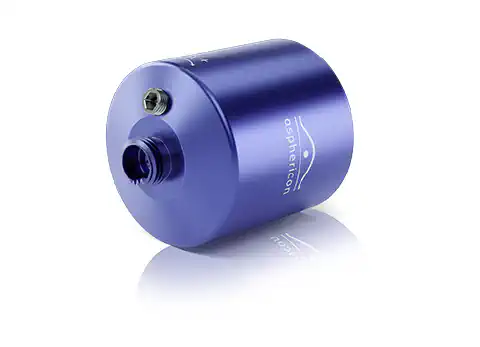
The a|AspheriColl is an adjustable fiber collimator/fiber coupler for perfect alignment of FC/PC patch fibers. Combine the collimator, available from stock for NAs up to 0.275, with BeamTuning or other beam shaping elements to obtain any desired output beam while maintaining a diffraction-limited wavefront. The optical design of the a|AspheriColl allows easy fiber coupling, alignment as well as adjustment of the wavelength without much adjustment effort. Due to larger output beam diameters, the fiber collimator can operate without additional elements and impresses with its compact design. The a|AspheriColl 355 nm covers the wavelength range from 350 to 405 nm and thus also enables diffraction-limited collimation of laser beams in the UV range.
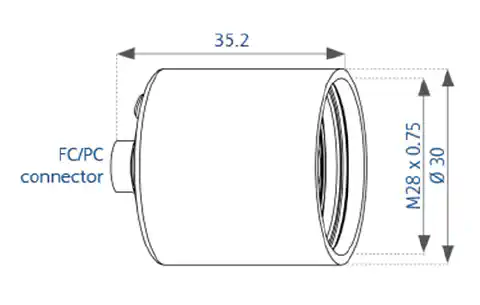
Specifications & Technical dimensions [mm]
- Fiber collimator covering for NA’s up to 0.275
- Focal length f = 20 mm, with Øe= 11,5 mm
- Optimized for wavelength range 350 nm – 1600 nm
- Easy wavelength adjustment
- Perfectly aligned lateral position
- Completely diffraction-limited performance (Strehl > 0.95) when used with FC/PC patch fibers
- No truncation effects compared to other available fiber couplers/fiber optic collimators
- Thanks to bigger output beam diameters, no additional expansion might be needed (shorter system length)
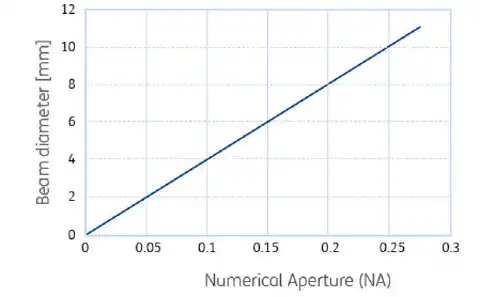
Output beam diameter
The diameter of the collimated output beam generated by an a|AspheriColl depends on the NA of the fiber from the laser source. This is a function of the wavelength.
The basic diameter is set as shown in the following graph. Pre-aligned for the wavelengths [nm] 355, 532, 632, 780 and 1064, the a|AspheriColl collimates output beams from single mode fibers with NA’s up to 0.275.
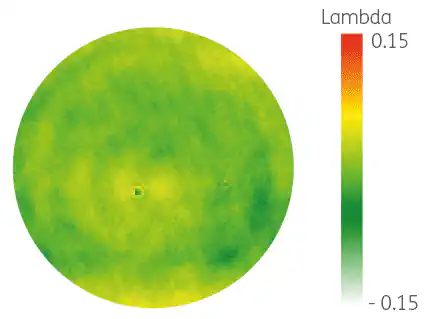
Optical performance
The map on the right shows the measured wavefront of an a|AspheriColl at 632nm. The diameter of the collimated output beam, which depends on the fiber’s numerical aperture (NA) and mode field diameter (MFD), is already in a usable range. The fiber collimator is already perfectly aligned to the design wavelength. If needed, it can also be adjusted in a certain wavelength range. Due to its outer diameter of 30 mm the a|AspheriColl fits into any standard holder (e.g. from OWIS). By simply pluging in the fiber, the a|AspheriColl is ready to use.
Wavelength range
Covered range of wavelengths for fiber optic coupling/fiber collimation with the a|AspheriColl for the design wavelengths [nm] 355, 532, 632, 780, 1064.
Fiber collimator / fiber coupler optimized for beam shaping optics
a|VariColl
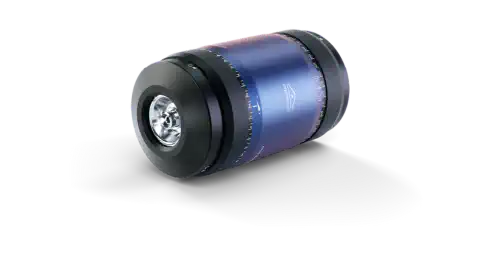
Discover asphericon’s latest fiber collimator, the a|VariColl. As well as coupling and collimating your optical fiber, it also enables you to enlarge or reduce your input beam, creating perfect input conditions for all subsequent beam shaping optics. The adjustable effective focal length allows compensation for manufacturing deviations in fiber NA (numerical aperture). Thanks to high-precision optics and a sophisticated optical design, beam size and divergence can be effortlessly modified independently of each other. Available in design wavelengths of 532, 632, 780, and 1,064 nm, the a|VariColl is distinguished by a compact design that allows the tiniest adjustments to output beam diameter and divergence.
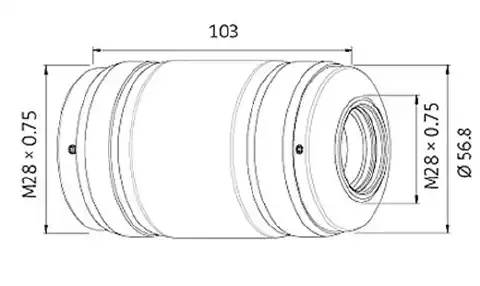
Specifications & Technical dimensions [mm]
- Effective focus length: 47–99 mm
- Fiber collimator for NAs from 0.055 to 0.12
- Available in four design wavelengths (532 nm, 632 nm, 780 nm, 1064 nm)
- Wide spectral range: 500–1,200 nm
- Generation of collimated diffraction-limited beams up to 11 mm 1/e² with RMS wavefront error < 50 mλ
- Adjustable beam diameter with constant divergence within the design wavelength
- Precise adjustment of divergence also possible
- Perfect for illumination of a|TopShape, a|AiryShape, and a|SqAiryShape, as the separate adjustment of divergence and beam diameter allows optimal input conditions
- Laser induced damage threshold: 12 J/cm², 100 Hz, 6 ns, 532 nm
Wavelength range
Covered wavelength range of the a|VariColl fiber collimator for the design wavelengths [nm] 532, 632, 780, 1064.
Flexibility
The a|VariColl was developed to compensate for variations in the numerical aperture (NA) of fibers due to manufacturing. For NAs in the range of 0.055 to 0.12, an output beam with a maximum 1/e² diameter of 11 mm can be achieved in diffraction-limited quality. For NAs below 0.12, smaller diffraction-limited diameters are also possible (see diagram).
Optical performance
Are you looking for a solution to smoothly change the EFL of your fiber collimator while easily connecting the patch fiber to your setup? The diagram shows the measured wavefront and intensity profile of the a|VariColl 532 nm. One of the key features of the a|VariColl is that a collimated beam remains collimated, no matter what beam diameter you choose. The a|VariColl generates a diffraction-limited wavefront and is thus perfectly suited for the use of beam-shaping optics, for example from asphericon’s BeamTuning range (a|TopShape, a|AiryShape, a|SqAiryShape). In particular, the separate adjustment options for divergence and beam diameter create optimal input beam conditions.
Perfect beam shaping and fiber coupling in one
a|TopShape LD Fiber
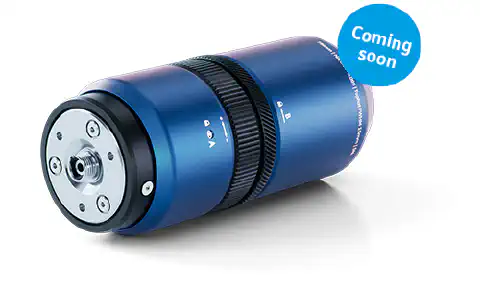
The a|TopShape LD Fiber is a asphericons newest beam shaping system designed for direct coupling to single-mode fibers. It produces a perfectly collimated Top-Hat beam with a homogeneous intensity distribution and a flat wavefront, ensuring stability over long distances. This system compensates for manufacturing variations in the numerical aperture (NA) of the fiber, allowing for flexible fiber selection and greatly simplified use.
The aspheric design enables optimal photon yield by allowing lossless redistribution of light, ensuring maximum efficiency and high output quality. Its plug-and-play functionality allows for seamless integration into existing systems, minimizing the need for extensive modifications. The operation of the system is simple and intuitive, with all control elements designed for ease of use without high technical experience.
Furthermore, the a|TopShape LD Fiber can be easily adapted to meet specific requirements by adding compatible BeamTuning products, offering a high degree of flexibility for various applications. Its compact and lightweight design also ensures quick and easy integration into a wide range of work environments, making it both portable and versatile.
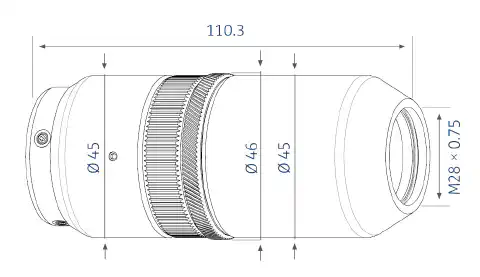
Specifications & Technical dimensions [mm]
- Unbeatable optical performance over a long and stable propagation distance (beam uniformity < 0.1 up to at least 2000 mm, RMS wavefront error < 0.05 λ)
- Completely diffraction-limited (Strehl > 0.9)
- Design wavelength: 780 nm
- Enables perfect connection with FC/PC or FC/APC patch fibers
- Output beam diameter @ FWHM: 15 mm
- Input NA range: 0.07 - 0.095 mm to compensate for manufacturing-related deviations
Please notice: The cut-off wavelength of the fiber should be as close as possible to the design wavelength, as it affects the MFD and NA at the application wavelength. A higher application wavelength relative to the cut-off wavelength results in a lower NA and a higher MFD.
Flexibility
Flexibility is one of the standout features of the a|TopShape LD Fiber. The system consistently delivers a highly uniform intensity distribution, as demonstrated by measurements taken at various working distances ranging from 300 to 2000 mm (see figure below). Even at extended distances, the beam profile maintains an outstanding homogeneity of less than 0.06, ensuring consistent performance across a wide range of applications. This stability and uniformity make the a|TopShape LD Fiber an ideal solution for tasks requiring precise and reliable beam shaping over varying distances.
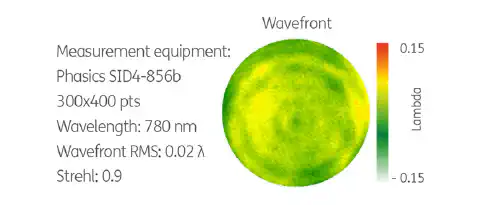
Performance
The map on the right shows the measured wavefront of the a|TopShape LD Fiber at 780 nm. This element generates a diffraction-limited wavefront, making it fully compatible with the BeamTuning line. With an RMS wavefront error of 0.02 λ, corresponding to a Strehl ratio of 0.9, the optical quality is exceptionally high.
The a|TopShape LD Fiber can be used as a stand-alone product, instead of combining a fiber coupler, a beam expander and a beam shaper. It significantly reduces the overall set-up size.
Application example - quantum inertial sensors
A specific application of the a|TopShape LD Fiber is in field-deployed differential quantum gravimetry, as demonstrated in the EU-funded FIQUgS project. In this context, the system must achieve an RMS wavefront error of less than λ/10 over the entire propagation range. This product serves as a proof of concept for various atomic inertial sensors and allows to adapt the a|TopShape LD Fiber for different applications requiring increased robustness, optical power, and beam propagation distances. The advantages of Top-Hat beams compared to the use of Gaussian distributions are outlined below referring to the results of the FIQUgS project.
Your request
